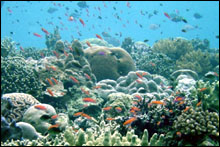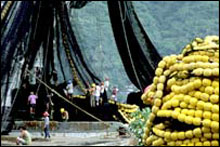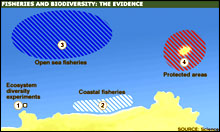Scientists call for wildlife reserve to cover 30% of oceans
|
This century is the last century of wild seafood - Steve
Palumbi
Scientists have called for almost a third of the world's oceans to be turned into protected areas for marine wildlife -- to maintain food supplies and stop damage to underwater habitats and wildlife.
More than 250 scientists from around Europe signed a declaration to coincide with World Oceans Day.
"We need to radically rethink our relationship with the sea," said Callum Roberts of the University of York, who is heading the initiative. "What that means is putting back refuges in the ocean for larger, more vulnerable wildlife; placing areas off-limits to fishing and exploitation so we can rebuild those ocean food webs that are so important."
He said that the best scientific advice was to protect at least 20% to 30% of the sea from exploitation in order to rebuild wildlife populations and restock fisheries.
Less than 0,006% of the world's 360-million square kilometres of sea is designated as protected. In Britain, only three square kilometres out of 760 000 square kilometres of sea is off-limits to any exploitation, including for oil and gas.
"Twelve per cent of the landmass is on protected areas now, so we lag far behind in terms of the marine environment," said Roberts. "If we don't start to do better, we will not be able to rely on the oceans for the food we will need as the world's population grows."
He added that the lack of action comes from a lack of understanding. "We haven't been aware of the impacts we've had on the sea until very recently. The impact we have on the terrestrial environment is right in front of our eyes and very obvious."
In the past decade, observation scientists have documented a steepening decline in the marine environment. Anoxic dead zones are increasing because of a build-up of organic matter and the collapse of coral reefs and fish stocks.
"We have been harvesting the large fish from the sea for the past few hundred years and we have been far too effective. There are now less than 10% of the large fish left that there were 100 years ago," said Roberts.
As fisheries have expanded, they have eroded the ocean's natural refuges. "There were always places that used to be too deep or dangerous, rough or remote to be fished. But the footprint of fishing has spread to the whole ocean and there's now hardly anywhere in the sea that is less than 2 000m deep that isn't fished."
A recent study suggested that all of the fish species humans exploit today will have collapsed by 2050.
Since 1950, 60% of the world's fish stocks have collapsed. "We've run out of new areas to fish now," Roberts said. "And we're virtually at the end of the list of species we can exploit."
Source: Guardian Unlimited © Guardian News and Media Limited 2007





